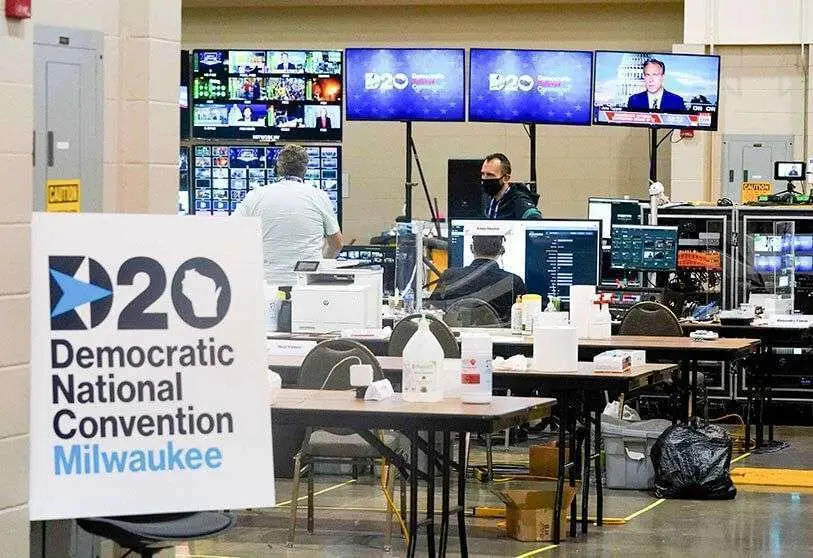Home stretch to beat Trump

The convention ritual for parties to choose their candidate for the U.S. presidency dates back to 1831. In those days, they were reduced to technical debates usually held in the largest hall of the hotels of the time. Their evolution has turned them into a gigantic and colorful spectacle, in which the best singers or groups supposedly addicted to the Democratic or Republican Party alternate their musical performances, the fiery speeches of the historical figures turned into fancy opening acts and the apotheosis, with all the artillery of light, sound and color, of the final proclamation of the "ticket", the duo that in case of victory will occupy the Presidency and Vice-Presidency of the most powerful nation in the world.
The respective conventions of the two major parties also mark the start of the final stretch of the electoral campaign. Until the first Tuesday after the first Monday of November, which this year will be the 3rd, there will be a close battle, without concessions and probably with all kinds of low blows, between the two finalists: the Democratic candidate Joe Biden, and the Republican Donald Trump.
This week's Democratic convention in Milwaukee - the Republican convention will be held the following week in Charlotte - will set new standards. The coronavirus is preventing crowds from gathering, which will take away much of the emotion of such events, and the consequent influx of militants, supporters, or just plain voters who might feel they are the protagonists of history by slipping one ballot or another into the ballot box.
This final stretch begins with the polls very much in favor of Joe Biden, who will break with tradition and accept his nomination virtually. The Democratic leader has never been a speaker who can subjugate the masses, so this time he will also not have a chance to show that his oratory skills can electrify his volunteers and supporters. Everything will be virtual, from the speeches of "sacred cow" Barack Obama and his wife Michelle, to those of his former primary rivals, Bernie Sanders and Elizabeth Warren, with a deliberately brief time for the rising star of the large Hispanic minority, Alexandria Ocasio-Cortez.
The fracture within the Democratic Party has not been stitched up, but everyone has decided to call a truce in the face of the common goal of getting Donald Trump, whom the socialist Sanders considers "the most dangerous president in the history of the United States," out of the White House. Biden and the majority of his party are counting on the contribution of the vice-presidential candidate, Kamala Harris, daughter of a Jamaican and an Indian, who, if she wins, will be the first woman to become the country's top judge.
But, in the face of the enthusiasts of the Democratic candidacy, and, of course, of most of liberal Europe, President Donald Trump could give a new surprise, like the one that four years ago brought him against all odds to the White House. Trump has already shown some totalitarian inclination by launching some "suggestions" such as postponing the elections under the pretext of the pandemic, blocking funds to the Post Office, which could collapse the vote for those who choose to do so by letter, and even warning about the alleged rigging of the elections, implying that he would not accept the result if it was unfavourable to him. In short, it is a blow to the solid pillars of American democracy, which with Trump has a golden opportunity to show its unwavering solidity.
The four years since Trump's first election have not changed the country as much as some would like to assume. It is true that the COVID-19 has caused a huge health and economic crisis, but in the American mentality, unlike the European one, it is not blaming the government almost entirely and waiting for the manna of the subsidy to fall. On the contrary, disasters spur the imagination and initiative of the country that has the most entrepreneurs for every thousand inhabitants, a paradigm that requires stability, law and order, values to which Trump appeals in the face of those who take advantage of excesses and unfortunate racial incidents to set everything on fire.
Trump does not hide the fact that if he is re-elected he will conclude the demolition of the current world order. An attractive target in the eyes of those who feel that the current one has left them behind or has not given them the opportunities they think they deserve. By establishing himself as the leader of that vast, deep Midwest, Trump has polarized the country, and even the world, throughout his controversial tenure.
Rebuilding the country and ending that polarization is the promise of the Democrats and the Biden-Harris tandem. The former will be a mammoth task no matter who wins, once it is clear that the crisis is the greatest since the Great Depression. The second will not be easy either. Trump's defeat will leave his supporters, who are more than some people think, with a bitter taste in their mouths and will fuel revanchism. In this final stretch that now begins, the outcome will affect everyone. But, as has been recalled so many times, only the citizens of the United States can vote in this election that can decide the fate of the planet.

